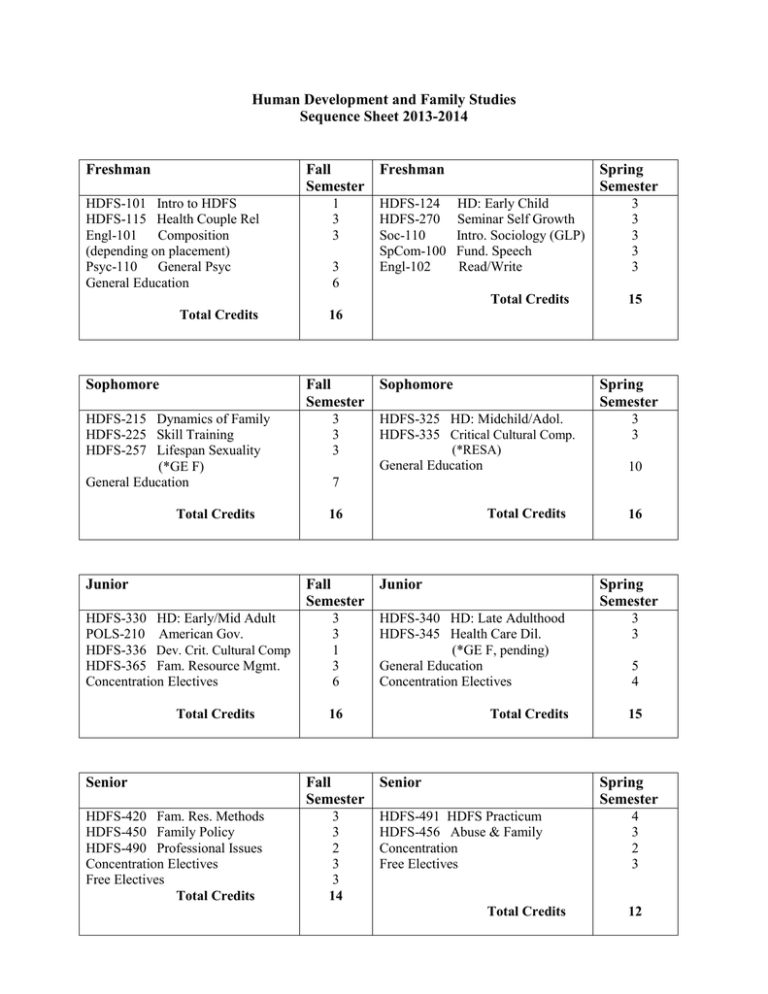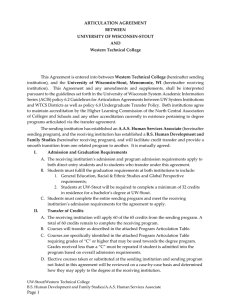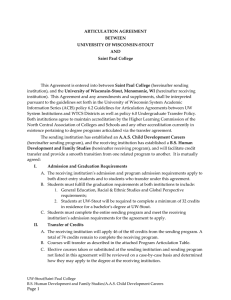
Human Development and Family Studies
Sequence Sheet 2013-2014
Freshman
Fall
Freshman
Semester
HDFS-101 Intro to HDFS
HDFS-115 Health Couple Rel
Engl-101 Composition
(depending on placement)
Psyc-110 General Psyc
General Education
1
3
3
Total Credits
16
3
6
HDFS-124
HDFS-270
Soc-110
SpCom-100
Engl-102
Spring
Semester
HD: Early Child
Seminar Self Growth
Intro. Sociology (GLP)
Fund. Speech
Read/Write
Total Credits
Sophomore
Fall
Sophomore
Semester
HDFS-215 Dynamics of Family
HDFS-225 Skill Training
HDFS-257 Lifespan Sexuality
(*GE F)
General Education
Total Credits
Junior
3
3
3
Total Credits
Senior
HDFS-420 Fam. Res. Methods
HDFS-450 Family Policy
HDFS-490 Professional Issues
Concentration Electives
Free Electives
Total Credits
15
Spring
Semester
HDFS-325 HD: Midchild/Adol.
HDFS-335 Critical Cultural Comp.
(*RESA)
General Education
3
3
10
7
Total Credits
16
Fall
Junior
Semester
HDFS-330 HD: Early/Mid Adult
POLS-210 American Gov.
HDFS-336 Dev. Crit. Cultural Comp
HDFS-365 Fam. Resource Mgmt.
Concentration Electives
3
3
3
3
3
16
Spring
Semester
3
3
1
3
6
HDFS-340 HD: Late Adulthood
HDFS-345 Health Care Dil.
(*GE F, pending)
General Education
Concentration Electives
3
3
16
Total Credits
15
Fall
Senior
Semester
3
3
2
3
3
14
5
4
Spring
Semester
HDFS-491 HDFS Practicum
HDFS-456 Abuse & Family
Concentration
Free Electives
Total Credits
4
3
2
3
12
*NOTE: 120 credits are required for graduation, including 46 general education credits (40
required by UW-Stout and six additional requirements by HDFS in the Social Behavioral
Science category, including: PSYCH 110, SOC 110, POLS 210 and 3 additional credits from any
SBSCI area), 53 core HDFS credits (assuming a 4 credit practicum), 15 concentration credits,
and 6 free elective credits.
HDFS courses marked with an “*” indicate that, besides meeting an HDFS requirement, they
also fulfill a general education requirement. When you take those courses, you are working
toward fulfilling the general education category (A,B,C,D,E, F, and Racial and Ethnic Studies RES A and B), but keep in mind that 120 total credits are needed to earn the degree, even if the
categories are met. If you plan carefully, you can satisfy many of the general education
categories with your core coursework, free electives, and/or concentration credits. This will give
you maximum flexibility in what courses to take to reach the 120 credit minimum for graduation.
If you are a transfer student, carefully selecting your classes may result in being able to use more
of your previous coursework to bring you to the 120 required credits. Please see a program plan
and contact your advisor to plan efficient progress toward degree.
Below is a list of other HDFS courses that count toward satisfying general education categories.
HDFS 352 Sexual and Gender Identities in Families and Societies GE E, 2 cr.
HDFS 410 Families in an Electronic World GE E, 3 cr.
HDFS 460 Religious Diversity and the Workplace GE E, 3 cr.












